Centennial Commemoration of the Imperial Iranian Air Force Held in California
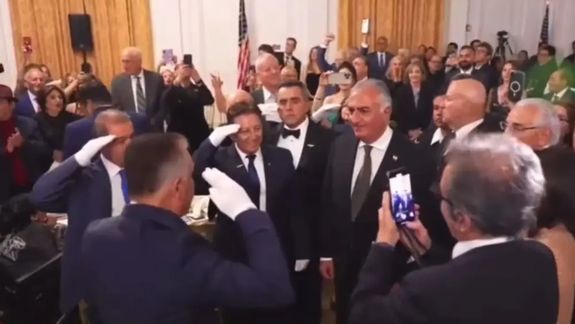
The centennial celebration of the Imperial Iranian Air Force took place in Yorba Linda, California, with the presence of exiled Prince Reza Pahlavi.

The centennial celebration of the Imperial Iranian Air Force took place in Yorba Linda, California, with the presence of exiled Prince Reza Pahlavi.
The event, organized by the Jewish communities of Los Angeles and the Persian American Civic Action Network, PACAN, was held at the Nixon Library, highlighting the historical significance and achievements of the air force established back in 1925.
Initially, Iran's efforts to acquire aircraft from the United States in the 1920s were unsuccessful due to Washington's refusal based on a World War I treaty. Consequently, the IIAF's early fleet was composed entirely of European aircraft, predominantly from British and German manufacturers. Following World War II, the IIAF began a gradual process of rebuilding its aircraft fleet, primarily sourcing its equipment from the United States and Great Britain.
By mid-1970s, Iran's air force had turned into one of the most modern and well-equipped air forces in the world, featuring advanced American warplanes, such as the F-14.
During the ceremony, Prince Reza Pahlavi paid tribute to the former officers of the Iranian Air Force, acknowledging their role in maintaining Iran's sovereignty during the Cold War. He praised the air force as one of the most advanced and proficiently trained in the world during its time, equipped with an array of fighter jets.
Pahlavi remarked on the air force's dual role in defense and diplomacy, stating, "At the height of the Cold War, this force not only protected the skies and land of Iran from any foreign aggression through deterrence but also played a role in creating peace and stability in some regional and international conflicts."
The centenary event served as a contrast to current practices in Iran, underlining the historical significance of a once-internationally respected military force. The gathering reflected a longing for the values and visions of an era before the Islamic Republic.
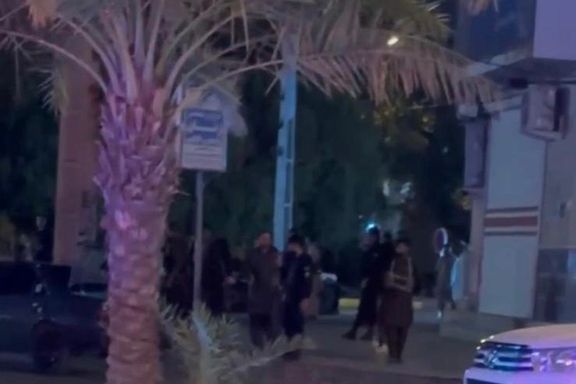
Iranian police in Iranshahr, in the restless Sistan-Baluchestan province, fatally shot two unarmed Baluch citizens without prior warning.
The incident took place Friday evening, though the reasons behind the shooting remain unclear.
While the identities of the victims have not been released, the security-affiliated Tasnim news agency provided a conflicting account. It cited Doustali Jalilian, the police commander of Sistan-Baluchestan, who claimed the individuals were armed and had attacked a police patrol unit while shouting religious slogans.
However, Haalvash that covers developments in the province contested the claim, releasing two videos showing the two men walking peacefully on a sidewalk before being abruptly fired upon from multiple directions, leading to their immediate deaths.
Following the incident, security forces sealed off the scene and removed the bodies, raising concerns about the transparency of the operation. This episode is not an isolated occurrence in the region. Baluch activists report that such incidents of unprovoked shooting by police are common.
A similar case occurred on May 13 in downtown Saravan, where military and security personnel shot at a family car from several angles without warning, killing a 14-year-old and severely injuring other family members. The local police commander later branded the victims as criminals with a violent history, a claim often disputed by local communities and activists.
The human rights organization HRANA noted that in 2023, Iran saw 402 victims of shootings by security forces, resulting in 120 deaths. The Baluch minority, residing in one of the poorest regions of Iran, has long faced severe persecution, including executions and allegations of unfair trials, particularly concerning drug-related charges.

A bipartisan group of US lawmakers introduced a bill on Friday that would impose targeted sanctions on Iranian officials and judges who arrest, jail and impose death sentences on dissidents.
Targeting Oppressive Officers to Mitigate Abuse in the Judiciary Act would impose sanctions “on the judges, prosecutors and investigators of the Islamic Republic’s Islamic Revolutionary Courts, which are involved in sham trials, torture, and inhumane treatment and sentencing of Iranian protesters and political dissidents.”
The bill is also known as the TOOMAJ Act, aptly corresponding with the first name of a dissident rapper, Toomaj Salehi, who has been incarcerated in Iran and sentenced to death. The young artist, known to millions of Iranians as Toomaj, published protest songs on social media during anti-government protests in 2022, known as the Woman, Life, Freedom movement.
Toomaj has become a symbol of arbitrary arrests, death sentences and hangings of dissidents in Iran. Trials are usually held behind closed doors, without an adequate defense team and due process. Charges are vague statements based on arbitrary concepts of Iran’s Islamic laws, such as dishonoring sanctities, or insulting the Supreme Leader. A protester demanding freedom for women or prisoners can be charged with endangering national security.
“Toomaj Salehi has used his platform to give a voice to the voiceless and bravely speak out against the Iran regime’s torture, abuse, and crackdown against the free will of the Iranian people," Rep. Young Kim, R-Calif., one of the bill's lead sponsors, said in a statement to The Associated Press. “Unfortunately, he is just the latest victim of the regime’s cruelty.”
She added that the bill will allow the US “to stand side by side with Toomaj and other peaceful protesters demanding basic human rights and take targeted action against the Iran regime.”
TOOMAJ Act was introduced by Representatives Young Kim (R-CA), Adam Schiff (D-CA), Mike Lawler (R-NY), and David Trone (D-MD), marks a vital progression in the fight against human rights abuses in Iran. An Iranian American advocacy group in Washington said that the bill will also penalize “hostage taking of Americans and legal residents, a nefarious tool long used by the Islamic Republic.”
US lawmakers have introduced an array of bills since September 2022, when Mahsa Amini was arrested for improper hijab in Tehran and received fatal head injuries in police custody. Her death three days later sparked the largest anti-government protests in 45 years in Iran.
The most famous bill targeting human rights abuses in Iran was the MAHSA Act that passed the US Congress in April. The Mahsa Amini Human Rights and Security Accountability Act, or simply the MAHSA Act, will see the imposition of sanctions on Iran’s supreme leader’s office, its appointees and anyone affiliated with the office and its work. However, it is not clear to what extent the Biden administration will pursue the bill’s implementation.
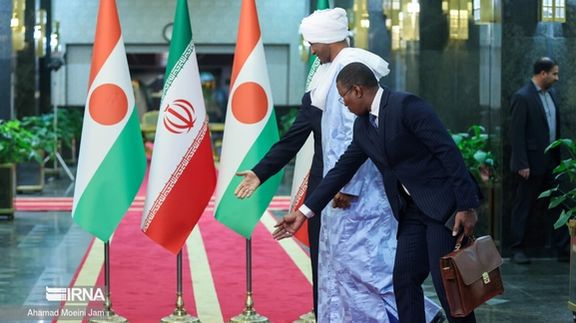
Recent reporting suggests that after covert negotiations, Iran and Niger have agreed on a $56 million deal to see Tehran acquire 300 tons of refined uranium.
First reported by the France-based media outlet Africa Intelligence in late April, it was revealed that Niger's military junta had engaged in "secret negotiations" with Iran for the delivery of 300 tons of yellowcake in exchange for drones and surface-to-air missiles.
Yellowcake is a concentrated form of uranium oxide, appearing as a yellowish powder. It is produced from uranium ore and serves as an intermediate step in making nuclear fuel or weapons.
French newspaper Le Monde has since corroborated the clandestine negotiations – and reports that the specific type of uranium is produced in the mines belonging to a French company.
Uranium, Le Monde reported, is Niger's most important export product and comes from mines that have been exploited since 1971 by the French group Orano in Arlit, located in north-central Niger.
Niger's Junta government has denied the secret negotiations and agreement.
According to Africa Intelligence, as part of the agreement, Tehran would provide large-capacity generators to Niamey to address Niger's energy deficit and support agricultural conversion efforts. These initiatives were launched by the new government, which came to power in a coup d'état on July 26, 2023.
The outlet's sources also said that a covert meeting between Iranian representatives and the Nigerien prime minister, Ali Lamine Zeine, occurred in August 2023 in Bamako, Mali. General Salifou Modi, the second in command of the Nigerien military junta, was also present. Iranian representatives are said to have also met with delegations of "pan-African" activists serving the juntas of Mali, Niger and Burkina Faso.
This deal would not only challenge the numerous sanctions and agreements designed to prevent Iran from proliferating nuclear weapons, but simultaneously raises concerns in Washington and Paris. If Tehran acquires more uranium, it could expedite its nuclear capabilities, escalating international tension.
The reported amount of uranium is roughly equivalent to Iran's 2019 domestic output.
This move also has the potential to create tensions between Niger and Western countries, which have been outspoken in expressing their concerns against the sale of uranium to the Islamic rulers in Iran, bolstering Iran’s nuclear program.
This could lead to economic sanctions and political isolation for Niger, which would further undermine security in the region.
Other experts believe that Niger’s Junta is using this deal strategically, attempting to leverage their extensive uranium reserves to yield political and economic concessions from other international powers.
Shifting Alliances and Geopolitical Tensions in the Sahel
In July 2023, Niger’s President Mohamed Bazoum was overthrown by a military junta known as the National Council for the Safeguarding of the Homeland (CNSP). This marked the sixth military takeover in Africa’s Sahel region since 2020.
The series of coups began in Mali in 2020, followed by Guinea, Chad, and Sudan in 2021, and Burkina Faso in 2022. Guinea, Burkina Faso, and Mali have all shown strong support for Niger’s CNSP, opposing external efforts to reinstate Bazoum.
Since taking control, Niger's junta has expelled French, other European, and now American forces, while seeking support from Russia. In March of this year, Niger's junta demanded the withdrawal of US forces after a meeting with American officials. During the meeting, senior US officials expressed concerns about the arrival of Russian troops and accused Niger's military government of planning a uranium agreement with Iran.
Responding to these accusations, CNSP spokesperson Abdramane criticized the US delegation for allegedly trying to deny Niger's sovereignty and threatening retaliation. He emphasized Niger’s right to choose its partners to effectively combat terrorism.
The US had previously established a significant military presence in Niger, including two bases as part of a 2012 counterterrorism agreement. One of these, Air Base 201, cost over $100 million and has been used since 2018 to target Islamic State terrorists and Jama'at Nusrat al-Islam wal Muslimeen (JNIM).
Former Iranian President Mahmoud Ahmadinejad’s visit to Niger over a decade ago, was aimed at purchasing uranium before the 2015 JCPOA agreement. Germany-based Middle East researcher Hamid Talebian suggests that access to Niger’s uranium could be a reward for Iran’s military assistance to Russia.
In response to the Le Monde article about the rumor of the purchase of “yellowcake” by the Islamic Republic of Iran from Niger, Mohammad Eslami, head of the Atomic Energy Organization of Iran, told journalists: “You must consider the source of the news. For the first time ever, we announced the news of the Islamic Republic’s modest nuclear program to the ears of people in all corners of the world in a completely professional manner.”
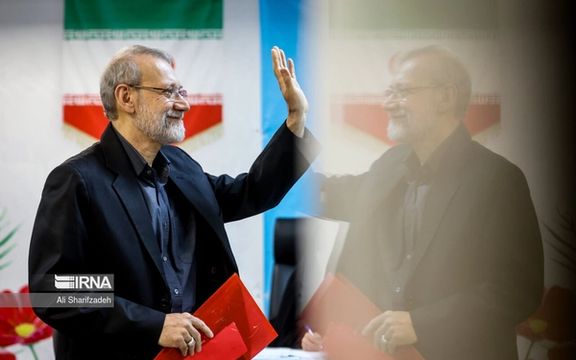
Former Speaker Ali Larijani’s registration to run for the presidency has sparked much speculation about whether Iran’s Supreme Leader has assured him that he will not be disqualified and will be allowed to run.
Some political analysts in Iran have welcomed Larijani’s decision to run, expecting that he may be able to improve the country’s international relations.
“It would be foolish for Larijani to enter the arena without any guarantees that the Guardian Council would approve him this time,” UK-based Iranian political analyst Shahir Shahidsaless tweeted.
Shahidsaless maintained that the question now is whether the political establishment, that is the Supreme Leader and his men, have prepared "to work with him" if he is elected or, on the contrary, it is Larijani who has promised to work with them.
Whether or not such guarantees have been made carries significant consequences. Mostafa Faghihi, chief editor of the conservative Entekhab news website in Tehran, believes that Larijani’s registration—and the possibility that he has received assurances from Khamenei has emboldened other moderates and reformists to register as well.
The Reforms Front led by former President Mohammad Khatami, however, says it will not support any candidate, presumably including Larijani, who does not hail from the reformist camp.
According to Shahidsaless, Larijani’s candidacy is “another game by the ruling establishment” for many Iranians. Khamenei and the Revolutionary Guard, they believe, are the main players who aim to increase voter turnout as a means of proving the Islamic Republic is a legitimate political system.
Other Iranians, he argues, believe voting for Larijani is the only way to prevent the hardliner Saeed Jalili from becoming president.
Larijani’s tweet Thursday can be interpreted in various ways
Larijani posted a tweet Thursday evening that can be interpreted in various ways. The only text in the tweet which has been viewed nearly two million times in less than 24 hours is “Without you we will not reach our destination”. “You” in this tweet can be interpreted as referring to Supreme Leader Ali Khamenei or the voters.
The tweet includes a google maps screenshot with the area where Supreme Leader Ali Khamenei’s office is located marked as the “starting point” of a car journey to the interior ministry, where registration takes place, and back to the area where the presidential office is also located marked as “destination”.
This may also be a suggestion that Larijani has received, or expects to receive, guarantees from Khamenei that he will not be disqualified, as he was in the 2021 elections.
Moderate conservative Larijani’s ultra-hardliner rival Saeed Jalili’s most viewed tweet in recent days has received around 260k views during the same time.
Larijani and Jalili’s divergence dates to September 2007 when the disagreements between populist Mahmoud Ahmadinejad and Larijani over a nuclear agreement with the West led to the latter’s resignation. Ahmadinejad then appointed Saeed Jalili as the secretary of the Supreme National Security Council.
At a brief press briefing after registration, Larijani emphasized that his government’s strategy would be security and power for “the whole region”. “[Iran's] military and defense capability not only guarantees Iran's security, but also supports the security of the region,” he said. He also maintained that his government will be inclusive of all political groups.
Many believe Larijani’s views and his approach to governance are very close to Hassan Rouhani’s whom Larijani has praised on various occasions.
Larijani’s statement, said expatriate political analyst Ali Afshari in a tweet, was a “clichéd imitation of Hasan Rouhani’s in 2012”. But this time, assuming that Larijani will pass the barrier of the Guardian Council, it will be extremely hard for him to “seduce” those Iranians who do not support the political right and are determined to overthrow the Islamic Republic.
But some Iranians may be influenced by Larijani’s emphasis on improving Iran’s foreign relations. “I’m pleased that Dr. Larijani spoke openly about ‘solving the sanctions issue’ as a foreign policy priority. For a long time, some people in the country have practically turned ‘solving the sanctions issue’ into a taboo and interpret it as giving up the country's security and independence,” Reza Nasri, an international relations expert in Iran, stated in a tweet.
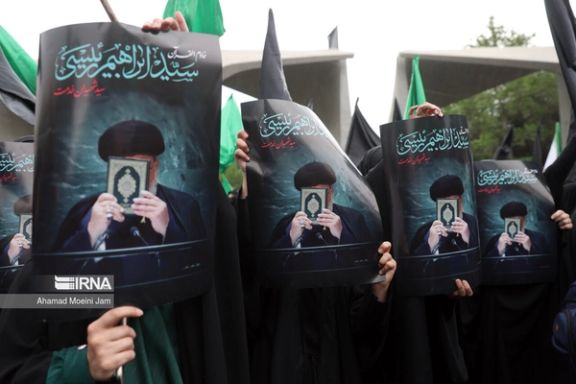
The sudden death of President Ebrahim Raisi and his companions in a helicopter crash on May 19, have revealed or accentuated some trends in Iranian politics.
Discussions about the Supreme Leader’s looming succession issue, primarily driven by speculation, have been sidelined for now as new issues come to the forefront – with three key trends emerging.
Sanctification
The Iranian state propaganda machine consistently pushes narratives that are 180 degrees opposite of what many Iranians say in public and how they act. For example, as many increasingly distance themselves from religious sanctity in public life, the government places even greater emphasis on it. Following Raisi’s death, videos were circulated of people kissing his coffin, and high-ranking clerics sharing stories about the first Shia imam “speaking” to him.
In another sanctification of Raisi, the governor of Neyshabur shared a “vision” reported by someone at the funeral – and allegedly connected to the Hidden Imam, the 12th Imam in Shia Islam, believed to be alive but hidden and expected to reappear at the end of times. This supposed vision, seen on the night of the helicopter crash, depicted the Hidden Imam at the crash site. He was said to be anxiously moving near the crash site but ultimately decided not to perform a miracle.
The frequent presence of clerics in Shia mausoleums and cemeteries has revived old beliefs about their connection to Shia saints. The Islamic Republic’s propaganda apparatus promotes these superstitions, presenting them to the relatives of the deceased as if they were true.
Routinization
Ali Khamenei has demonstrated that he does not want any change in the ruling class. The vote of about two-thirds of the parliament members for Mohammad Bagher Ghalibaf as speaker reflects the Leader's desire for continuity and stability. Despite the faction currently controlling both the parliament and the executive branch not presenting any plan to address the country's problems, it will remain in power. Khamenei is disregarding the many corruption allegations against Ghalibaf.
Following Khamenei’s advice, the government is attempting to portray a sense of normalcy. To this end, they have invited Mohammad Bin Salman to visit Iran. It is interesting that the Islamic Republic is using the invitation to bolster claims of normalcy while they have routinely called Saudi Arabia the “worst state in the world”.
Domestically, they are creating an illusion of participation and competition by including figures like former Parliament Speaker Ali Larijani, potentially Mahmoud Ahmadinejad and dozens of others in the presidential elections, despite these individuals having been previously purged from the political scene. This move is presented as if it can revitalize the political landscape.
A new wave of arrests and intimidation
Due to widespread public opposition to the government, arrests of dissidents have been ongoing. However, the specific targets and directions of these arrests shift according to circumstances and events.
In the post-Raisi era, the widespread arrests and clampdown have focused on individuals celebrating, mocking, or ridiculing the regime in connection with the helicopter crash.
Before the arrests began, the country's Attorney General warned and threatened the public. "It is necessary to take necessary measures against those who misuse cyberspace about this incident to disturb the mental security of the society and disturb the public mind by publishing false content, lies, and insults; according to the regulations, a quick, effective, and deterrent action will be taken, and the result will be announced to this prosecutor's office,” he said.
In its announcement regarding the unexpected incident involving the president and the accompanying delegation, the Cyber Police stated that, in fulfilling its inherent duties and assigned missions, it carefully monitors cyberspace. Users are advised not to pay attention to rumors and false news.
The semi-official news agency ISNA, quoting Kerman province’s public prosecutor, reported that 288 social network users were identified as "virtual activists and leaders." In addition to "phone warning and guidance" to 254 people, "eight were summoned" to the judicial authorities.